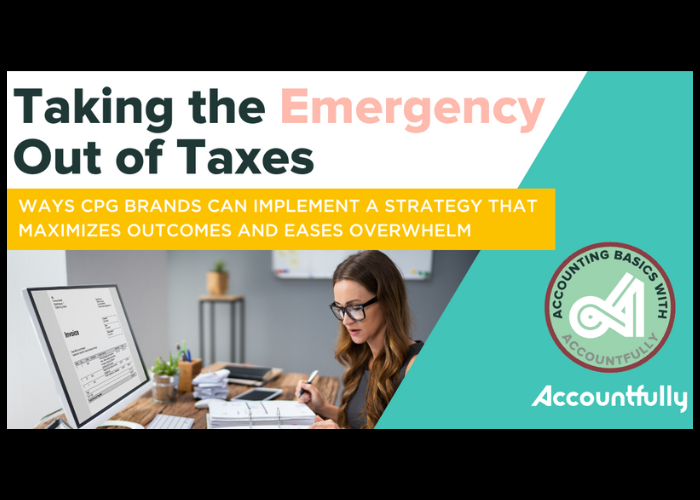
Accounting isn’t the sexiest of topics. But all other areas of the business depend on understanding your numbers, whether that be cash-flow planning or tax considerations.
This month, we are launching a series called Accounting Basics from Accountfully, which will simplify the complexities of CPG-related accounting by offering simple actionable advice founders can put to use immediately. The series covers frequently asked questions posed by the industry like inventory management, cash-flow planning, tax considerations, bookkeeping, and accounting practices. If you have struggled to understand foundational accounting subjects and how to maximize them for your business, join us as we discover better ways to calculate the cost of goods sold, ways to leverage your products for growth, and more!
We will kick off with everyone’s favorite topic: taxes. How did tax season treat you this year? Are you still waiting out that extension hoping that October comes around and all will be right again?
What if we told you that by October, you will be only about six months away from this year’s tax due date. For founders of emerging brands, this thought can be stress inducing, Take a breath. We will provide some tips and resources to help you better prepare yourself for taxes and execute a more successful tax strategy.
Start by Being Proactive
We don’t have to tell you that leveraging inventory to support a profitable business is a lot trickier than it seems. Just when you thought the creation of an incredible product was tricky, you quickly learned that managing the availability of the said product and the associated supply chain was way harder. Do you know what this does for implementing a better tax strategy, though? It teaches you to be a planner and be proactive. That is the first step to a winning tax strategy. So we will start there.
Planning ahead and understanding what you owe; monthly, quarterly, and eventually yearly will chip away at the overwhelming tax liabilities you see doing things last minute. For example: make sure you are aware of the sales taxes you owe each month. Calculate quarterly tax obligations and pay them. If you don’t have a team in place to support you, there are helpful resources like Quickbooks and Avalara to help you understand what you owe. More on that below. But first, we encourage you to download and read the Accountfully tax guide. The guide outlines three major areas to focus on and consider in your tax planning; obligations, outcomes, and implications. Small businesses can learn how to rework their tax plan by proactively focusing on these areas.
Your Foundational Mantra: Good Books Make for Good Taxes
How do you know what you earned, paid, what is deductible, and what you owe, if you don’t have up-to-date bookkeeping? You don’t. We accountants at Team Accountfully stress that accurate bookkeeping is the foundation of successful tax compliance Having up-to-date books will always give you the data you need to win at taxes. This is precisely why most of our clients use us for their tax compliance each year. We already have the data at hand.
Make sure you are closing the books monthly. Even if you are still in the DIY stage, it is imperative that you schedule time on a regular basis to look at your invoices, code any transactions and close out any payments made. Sometimes this is literally scheduling a recurring calendar appointment for yourself to dig into your Quickbooks every week. This is better than ignoring your books for months on end, and waiting for a small wrinkle in the space-time continuum to open up to a world where you are motivated to reconcile your books one day.
It is much better to have a professional managing your books and setting up proper systems from the beginning, but if you are in a position where you must do it, there are some best practices. Read our FAQ Roundup on Bookkeeping to see what we suggest in detail.
The Nexus of Sales Franchise Taxes
Where do you house inventory? Do you sell from multiple locations? Are you set up to pay sales tax properly? Ensure you know what you need to collect and pay, then pay it each month. Late fees are a sloppy and costly mistake. Use tools to help you calculate this and set calendar reminders to log in to any state tax payment portals and report taxes paid online. Online e-commerce websites like Shopify make it easy to pull sales tax reports to check your payments and pull details as needed. Keep in mind that the settings for your taxes owed need to be set up properly within your e-commerce site ASAP to ensure sales taxes are automatically collected at checkout and the reporting will accurately reflect what you paid.
To learn more about sales tax and nexus, consult our livestream explaining some basic tips.
Long-term Tax Considerations
The choices you make today surrounding things like accounting methods–cash versus accrual, or business entity type, can impact things like obtaining funding and a long-term business sale. If you are wanting to accomplish certain things–even if it is just being able to get a loan to inject some capital into your business–flying by the seat of your pants is not the way to go. Let’s take a simple business loan for example. If you are consistently showing a loss each year to minimize tax liabilities, but want to get a loan to launch your nifty new product, how is that going to look from the lender’s perspective? To earn funding, most of the time you need to show that you have the ability to not only pay off the loan long term but that you are not on a “going out of business any day now” type trajectory. That is just one example of operating now in a fashion for future goal success outcomes. If funding and investors are in line with your longer-term goals, check out our two-part podcast with the Financing Man himself, Keith Kohler. We dive into this at length; it is a great way to understand which types of funding are out there, and for what business stage they best suit. Part two shares the action items required when you are ready to get started.
Take Advantage of Benefits
Are you taking advantage of all of the resources and benefits available to you as a product-based business? Do you even know they (or which ones) exist? When taxes are a reactive exercise, you may be missing out on or delaying some prime benefits like the Research and Development credits available to qualifying companies. Planning your actions through the year to ensure you are operating along the qualifying parameters will make qualifying for these credits a lot simpler, and benefit your business. The R&D Credit is a top tax-related item we support at Accountfully, mainly because of our large CPG client-company count. We have helped clients benefit from the time spent by their employees developing improvements in their products and helped them hone in on the exact methods and factors they need to qualify. You can discover more information on the IRS website’s FAQ page.
Staff and Payroll Tax Requirements
Depending on how many employees you have and what type they are; W2 or contractor, you will have additional tax obligations that must be met from payroll taxes to sending 1099s. Using an intuitive and easy-to-manage system like Gusto can ease a lot of the challenges surrounding onboarding employees, while Quickbooks can help prep any tax documents. Again, these systems will only do so much. Your diligence in inputting the correct information and accessing the features will influence your outcomes. For more details surrounding payroll and the 1099 process, take a gander at our Payroll FAQ Roundup and start demystifying the 1099 here.
What it all comes down to
When you run a business, small or not, taxes are no longer a last-minute activity but needs to become a year-round process that ensures maximum value to your current and long-term goals. At the foundation of easing tax woes is consistent, quality bookkeeping, which can be managed to a certain extent in a DIY state, if done methodically. At the end of the day, to win the tax game, you need to adopt a year-round strategy that capitalizes on all of the benefits available to you and incorporates tools that support you. When leveraging these tools, you still need to input the proper data and set them up correctly in order to automate things as much as you can.
If navigating the tax process alone is too overwhelming, there are flexible and scalable solutions out there that can help. Feel free to share your tax frustrations with us over a call, and we will gladly put together a plan that can work for you.
•••

About Claire Pelson
Claire Pelton leads the marketing team at Accountfully; an outsourced accounting firm specializing in CPG businesses. She has over 15 years of experience writing articles covering automotive, overseas conflict, equine, and outdoor goods/adventure subjects. As an entrepreneur herself, she understands the struggles of being a business owner; especially those related to managing and accounting for inventory. Claire brings simplicity to these common accounting struggles under the guidance of the accounting subject matter experts at Accountfully.
Accountfully‘s services range from basic bookkeeping to advanced CFO level advisory and are designed to be flexible and scale alongside a growing business.Accountfully provides easy-to-understand pro tips designed to help emerging brands better understand and more effectively leverage accounting basics in their daily business practices.

